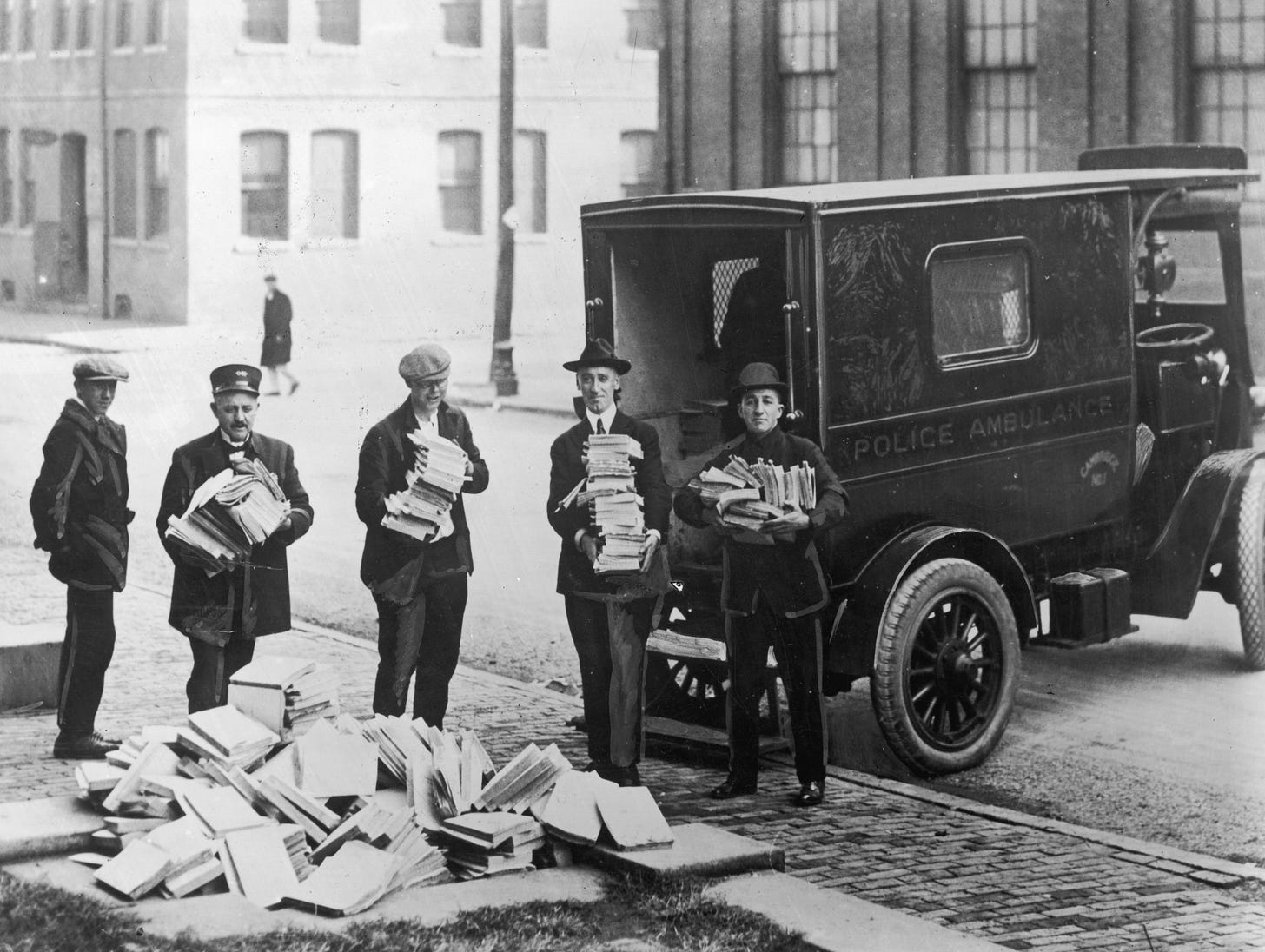Lessons from a Red Scare
The American people are capable of turning the tide against repression.

PN is supported by paid subscribers. Become one ⬇️
🎧🎧 Tune in to a new episode of Nir & Rupar on the Substack app and ask us questions live this afternoon at 2pm eastern 🎧🎧
Out of control federal agents invading the nation’s cities and kidnapping people en masse, a president and his cronies fomenting public anger and fear of immigrants, and dissent suddenly declared to be an illegal threat to national security.
All of that is happening now. But it also happened in 1919, at the height of what came to be called the first Red Scare, when a young J. Edgar Hoover and his new federal police force led a crackdown on dissent, focused on “radical” Americans born abroad.
Hoover and then-Attorney General A. Mitchell Palmer had plans to use another tool now favored by the Trump regime — mass deportation. But while Hoover and Palmer did succeed in silencing prominent dissenters, their deportation scheme largely came undone as the public became increasingly revulsed by the government’s performative cruelty and lawlessness.
It is a story with some lessons for our time about the danger of staying silent, and also of the power of opposition in the face of authoritarianism.
The deep roots of xenophobia
It may appear that the obsessive hatred of “foreigners” Trump tapped into 10 years ago emerged out of nowhere. But in fact, xenophobia has been at the center of American culture and politics since at least the 19th century. For example, nativist opponents of the then-recent waves of Catholic and Irish immigrants were a key constituency in the Republican Party that elected Abraham Lincoln president.
After World War II, America seemed to turn over a new leaf, signified by the passage under President Johnson of the 1965 Immigration and Nationality Act, which largely voided the exclusionary laws enacted during the first quarter of the 20th century. Generations of Americans grew up learning to celebrate the United States as a “nation of immigrants” and to value the economic and cultural contributions immigrants make to the country.
But in recent decades, politicians like Pat Buchanan and especially Trump have demonstrated that far from being banished, xenophobia and racism lurk under the surface and at the margins of American culture, waiting to be unleashed by those wishing to use it for political gain.
When Trump embarked on what he recently called his “war within” America, he had many models to follow. But the most darkly apropos was the first “red scare” that commenced just over a century ago.
When waves of immigrants — many from Eastern Europe and Italy, and many Jewish and Catholic — entered communities across the country during the turn of the last century, they were met with suspicion and discrimination. The fact that small groups of anarchist terrorists, many of whom were immigrants, engaged in bombing campaigns against business and government leaders (including Palmer himself) only added to the atmosphere of fear.
When President Wilson entered the nation into World War I in 1917, the declaration of war was met with widespread protests, many of them led by foreign-born labor activists. Palmer and Hoover spearheaded the government’s response to the anti-war movement by targeting “radicals,” many of whom were immigrants, by blaming them and their purportedly deviant cultures for endangering the nation during a time of war.
Among those targeted was Emma Goldman. Born in what was then the Russian Empire, Goldman came to the US at age 16 with little more than the sewing machine she needed to work in a sweatshop. But in a few short years she became one of the nation’s most prominent activists for causes ranging from labor rights to birth control, which she promoted through both publications and speeches — often attended by huge crowds — that she delivered in fluent German, Yiddish, and English.
Goldman had many brushes with the law as she rose to prominence. For example, she was arrested for “incitement” after she expressed anarchist political views in New York’s Union Square. During a 1893 speaking tour in support of activist John Turner (who was deported for supporting anarchism and workers’ rights), Goldman set out to “awaken many Americans to the fact that the liberties guaranteed in the United States, among which the right of asylum was the most important, had become nothing but empty phrases to be used as fire-crackers on the Fourth of July.”
In 1917 — after America entered World War I — Goldman and her associate Alexander Berkman (who had been imprisoned for scheming, along with the uncharged Goldman, to assassinate steel magnate Henry Frick) started organizing against the draft and quickly found themselves squarely in the sights of Hoover and the federal government. Not only were they cultural and political “radicals,” but they were also Jewish, making them particularly reviled by antisemites in positions of power. So it’s not surprising that they were included in one of the first waves of Hoover’s arrests.
A raid targeting Goldman and Berkman took place at the offices of their magazine, Mother Earth, which was known for publishing “subversive” works of leftist activists, as well as philosophers (including Friedrich Nietzsche) and fiction writers (such as Frankenstein author Mary Shelley). Hoover’s G-Men later bragged about their seizure of massive amounts of “propaganda.”
After declaring war, Congress also passed the Espionage Act — still the primary criminal “national security” law — to aid Hoover and his crew in going after “subversives.” Goldman and Berkman were among the first to be charged under the new statute.
They were tried in June 1917. When a military band outside a conscription office near the courthouse played the Star Spangled Banner, Goldman and Berkman were reportedly the only people in the courtroom not to stand up. But in her defense summation, Goldman spoke of her patriotism and reverence of the Constitution’s protections of free speech and due process:
We say that if America has entered the war to make the world safe for democracy, she must first make democracy safe in America. How else is the world to take America seriously, when democracy at home is daily being outraged, free speech suppressed, peaceable assemblies broken up by overbearing and brutal gangsters in uniform; when free press is curtailed and every independent opinion gagged. Verily, poor as we are in democracy, how can we give of it to the world?
The jury, however, found Goldman and Berkman guilty. The judge sentenced them to prison and recommended that they be deported after serving their sentences.
A law passed in 1918 permitted the deportation of anarchists, labor organizers, and other non-citizen activists. Goldman, however, had a claim to citizenship because her former husband was one. The government addressed that “problem” by denaturalizing him, and thereby Goldman as well, foreshadowing a strategy the Trump Regime has announced it also intends to pursue.
In 1919, soon after their release from prison, Goldman and Berkman were served with deportation orders. The orders were signed by Department of Labor official Lewis Post, a former publisher and once “ardent champion of free speech,” exemplifying what Goldman described as a “lack of stamina and backbone” from many former progressives in the face of a wave of repression she decried as “tragic.” Goldman and Berkman lost a brief deportation hearing.
Soon thereafter, Hoover’s brutal “Palmer Raids” proceeded in earnest. On November 17, 1919, federal agents violently served over a thousand warrants across a dozen cities on the Union of Russian Workers, effectively wiping out the organization and others like it. After Goldman protested the raids, she and Berkman were jailed on Ellis Island, along with many other radicals awaiting deportation.
A few weeks later, Goldman and hundreds of other detainees were hurried out of their cells in the middle of the night and rushed onto tugboats bound for a leaky ship docked in Brooklyn that would send them into exile. As the immigrant Americans were herded onto the vessel, later known as the Red Ark, a crowd jeered them.
Upon boarding, Goldman was approached by a proud J. Edgar Hoover, who was apparently there to gloat, and was heard to ask: “Haven’t I given you a square deal, Miss Goldman?
“Oh, I suppose you’ve given me as square a deal as you could,” Goldman replied. “We shouldn’t expect from any person something beyond his capacity.”
Goldman, then 50, did not return to her home, the United States of America, until after he death. She was buried in Illinois, alongside several of those executed for their roles in the 1896 Haymarket Affair, which is now commemorated as May Day.
The nation has second thoughts
After Goldman was exiled, the Palmer Raids continued in earnest. Hoover and Palmer also devised plan to mass deport foreign-born “radicals” that today is the stuff of Stephen Miller’s dreams.
But then an unexpected thing happened. Post, who had become the acting head of the Department of Labor, got some backbone.
Post oversaw investigations that found many of those caught up in Palmer Raids had been arrested and targeted for deportation based on unreliable evidence or otherwise treated in derogation of due process protections. He ordered some detainees released, and he refused to sign more deportation orders. Palmer was outraged and even publicly suggested that Post — who he falsely labeled a “Bolshevik” — should be impeached.
But as the weeks and months proceeded, something else began to happen. Members of the American public, who previously seemed to agree with the mob that jeered at Goldman, began to change their minds as evidence emerged of the brutality and lawlessness of the G-Men. And the deportation scheme ended up failing. Out of 6,396 cases Hoover brought, fewer than 600 ended in deportations.
To be sure, all was not sweetness and light. In 1924, Congress passed new legislation that slammed the door on legal immigration from many countries until the reforms of 1965, and later prevented many refugees from Hitler’s Germany from obtaining asylum in the US. The costs of the waves of repression surrounding the first Red Scare and of the one that followed World War II were large.
Now, as we face the third massive wave of xenophobic repression in our nation since the first decade of the 20th century, it is important to remember that the damage caused by such campaigns is certain to be long lasting. Ripping Americans from their families, communities, and places of work will not merely damage the economy — it will also leave a wound in the society that may never fully heal.
But, as Emma Goldman hoped, and Louis Post later demonstrated, the American people are capable of turning the tide against repression, or at least blunting it, even if that effort feels hopeless.
In a recent decision ruling against the Trump administration’s scheme to deport students and scholars based upon the content of their speech by invoking (in what Goldman would certainly find ironic) the fight against antisemitism, Judge William Young got to the heart of the challenge facing us and our fellow Americans.
“I fear President Trump believes the American people are so divided that today they will not stand up, fight for, and defend our most precious constitutional values so long as they are lulled into thinking their own personal interests are not affected,” Young wrote. “Is he correct?”
The question remains very much open. But the history of the first red scare teaches us that a better future is possible and worth fighting for.
That’s it for today
We’ll be back with a special Saturday edition tomorrow. If you appreciate today’s PN, please do your part to keep us free by signing up for a paid subscription.
Thanks for reading, and for your support.







Thank you for this powerful excavation of history. What strikes me most is how little has changed in the behavioral script: cruelty is never incidental, it’s instrumental. From Hoover’s raids to today’s “war within,” the same pattern repeats…fear manufactured, dissent criminalized, and human beings reduced to props in a theater of control.
I’ve been writing about this for months: cruelty isn’t a byproduct of authoritarianism, it’s the point. It’s the loyalty test, the spectacle, the signal that law has been hollowed out into performance. Your piece underscores that lesson with clarity, and reminds us that silence only feeds the machinery.
— Johan
Professor of behavioral economics and applied cognitive theory
Former Foreign Service Officer
This is a FANTASTIC piece, one I hope to share. It will certainly serve as a backdrop in my thoughts as I head out for yet another local rally on Oct 18th♥️♥️♥️